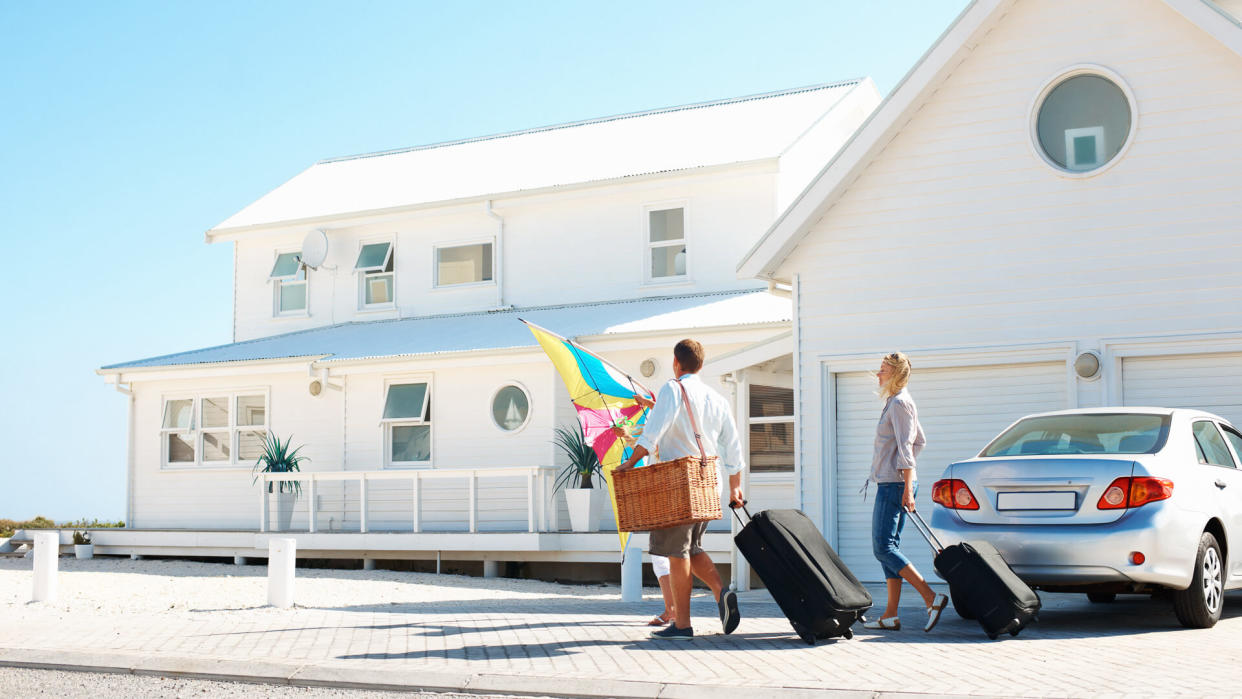How To Turn Your Vacation Home Into an Airbnb

Since the pandemic, demand for Airbnbs has surged. According to AirDNA, the average occupancy rate for short-term rentals in the U.S. has increased by 10% since 2019 and short-term rentals have earned an average of 39% more annually as compared to before the pandemic. With such encouraging numbers, you may be considering converting your own vacation home into an Airbnb. Before you do, though, here’s what the experts say you need to know first.
See the List: GOBankingRates’ Best Banks of 2023
Good To Know: 3 Things You Must Do When Your Savings Reach $50,000
Read More: Unplug These Appliances That Hike Up Your Electricity Bill
Analyze the Local Market
Although Airbnbs can produce substantial passive income, not all markets are ideal. If your vacation home is in an area that has strict short-term rental regulations, it might not be worth the effort of converting it into an Airbnb, said Avery Carl, a real estate agent, owner of nine short-term rentals and founder of the Short Term Shop.
Instead, she recommends Airbnb-friendly markets that are more resistant to recessions.
“It should be in a regional drivable vacation market, not an expensive flying vacation market like Aspen,” she said. “If you’re in the south, consider the Smokies in Tennessee, or if you’re in California, maybe it’s Big Bear.”
According to AirDNA’s 2021 market report, small cities or rural locations provide the highest average annual revenue for short-term rental owners, followed by mountainous or lake-side destinations.
Set Up Your Financial Systems
Carl recommends setting up separate bank accounts before launching your vacation home on Airbnb. This will make paying and filing taxes easier in the long run.
“You don’t want your short-term rental income going into the same bank account as your W-2 income,” she said. “Have separate bank accounts and separate debit cards so you can keep track of your expenses.”
Don’t forget lodging taxes and renter’s insurance, said Chris Cook, senior director of sales at Evolve: “Once you confirm that you have the required permits to operate a short-term rental in that area, you want to make sure you’re charging the appropriate amount of tax and have a plan to accurately remit those taxes.”
Provide a Great Experience To Get 5-Star Reviews
As demand grows, Airbnb owners can charge higher rates. But with higher rates come higher expectations, which means owners must work even harder to achieve those crucial five-star reviews.
“I encourage owners to mind the importance of review scores in short-term or vacation rentals,” Cook said. “Reviews play a crucial role in the performance of your rental, and the owner or property manager plays a large role in delivering a five-star experience. That includes accurate photos and descriptions of your property, having a well-appointed rental, cleanliness, and timely and responsive communication.”
Cook also recommends responding to all reviews, even if they’re not positive.
“The reviews your hospitality experience fetches are really important,” he said. “In the event that you have anything less than a five-star review, ideally you’re responding and addressing whatever opportunities there are.”
Decide If You Will Self-Manage or Hire a Property Manager
Before launching your Airbnb, decide if you will self-manage your rental or hire a property manager.
Self-managing owners must market their rental, manage handymen and cleaners for the property, purchase supplies and communicate with guests, which includes answering texts and phone calls if an issue arises during a stay. They also need to determine their nightly rental rates, which should fluctuate seasonally to increase occupancy and revenue.
“If you make your home available 365 nights a year, you’re going to be very busy,” Cook said. “It can be a full-time job.”
The alternative is hiring a property manager. Short-term rental property managers charge anywhere from 10% to 50% of an Airbnb’s total bookings, with all-inclusive management at the higher end of that range.
If you don’t want a full-time job but don’t want to give up your profit either, a hybrid property management company may serve you best, Cook said. For example, Evolve charges owners 10% of all bookings to take care of marketing, guest communication and support, rate-setting and renter’s insurance ($3,000 in property damage and $1 million in liability).
Carl, though, said self-management doesn’t have to consume all your time. Owners can use channel managers (to sync calendars on multiple booking sites and manage guest communication), smart pricing software and scheduling managers that automatically notify cleaners after a booking.
“If owners are properly utilizing technology, self-managing an Airbnb should take about 30 minutes per week for one property,” Carl said. “That does not necessarily double when you buy a second property–it’s more like a 10% increase. The first week, you’re going to be pulling your hair out. That’s the most stressful and the most labor-intensive time. But once you get everything set up, then you’re no longer really managing the property. You’re just managing your systems at a higher level.”
More From GOBankingRates
This article originally appeared on GOBankingRates.com: How To Turn Your Vacation Home Into an Airbnb


